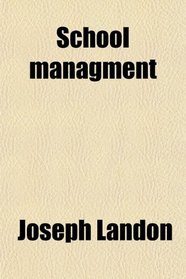Search -
School managment
School managment
Author:
Purchase of this book includes free trial access to www.million-books.com where you can read more than a million books for free. This is an OCR edition with typos. Excerpt from book: CHAPTER II. THREE LINES OF EDUCATIONAL DEVELOPMENT. In considering the training and growth of the child, it is usual to divide education into five branches... more »
Author:
Purchase of this book includes free trial access to www.million-books.com where you can read more than a million books for free. This is an OCR edition with typos. Excerpt from book: CHAPTER II. THREE LINES OF EDUCATIONAL DEVELOPMENT. In considering the training and growth of the child, it is usual to divide education into five branches... more »
ISBN-13: 9780217870528
ISBN-10: 021787052X
Publication Date: 8/18/2009
Pages: 310
Rating: ?
ISBN-10: 021787052X
Publication Date: 8/18/2009
Pages: 310
Rating: ?
0 stars, based on 0 rating




